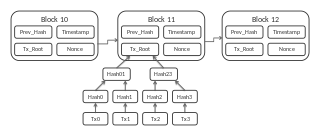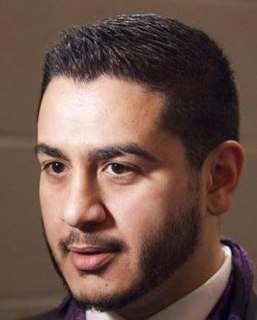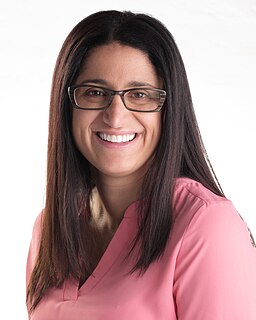Related Research Articles

The National Superconducting Cyclotron Laboratory (NSCL) is located on the campus of Michigan State University and is the leading rare isotope research facility in the United States. Established in 1963, the cyclotron laboratory is the nation’s largest nuclear science facility on a university campus. Funded primarily by the National Science Foundation and MSU, the NSCL operates two superconducting cyclotrons. The lab’s scientists investigate the properties of rare isotopes and nuclear reactions. In nature, these reactions would take place in stars and exploding stellar environments such as novae and supernovae. The K1200 cyclotron is the highest-energy continuous beam accelerator in the world.

The University of Texas Health Science Center at Houston (UTHealth) is a public academic health science center in Houston, Texas. It was created in 1972 by The University of Texas System Board of Regents. It is located in the Texas Medical Center, the largest medical center in the world. It is composed of six schools: McGovern Medical School, The University of Texas MD Anderson Cancer Center UTHealth Graduate School of Biomedical Sciences, UTHealth School of Dentistry, Cizik School of Nursing, UTHealth School of Biomedical Informatics and UTHealth School of Public Health.

Oregon Health & Science University (OHSU) is a public university in Oregon with a main campus, including two hospitals, in Portland, Oregon. The institution was founded in 1887 as the University of Oregon Medical Department and later became the University of Oregon Medical School. In 1974, the campus became an independent, self-governed institution called the University of Oregon Health Sciences Center, combining state dentistry, medicine, nursing, and public health programs into a single center. It was renamed Oregon Health Sciences University in 1981 and took its current name in 2001, as part of a merger with the Oregon Graduate Institute (OGI), in Hillsboro. The university has several partnership programs including a joint PharmD Pharmacy program with Oregon State University in Corvallis.
The University of Maryland School of Medicine, located in Baltimore City, Maryland, U.S., is the medical school of the University of Maryland, Baltimore and is affiliated with the University of Maryland Medical Center and Medical System. Established in 1807 as the College of Medicine of Maryland, it is the first public and the fifth oldest medical school in the United States. It was also the first medical school to institute a residency training program. UMB SOM's campus includes Davidge Hall, which was built in 1812, and is the oldest building in continuous use for medical education in the Northern Hemisphere.

Michigan Medicine, formerly the University of Michigan Health System (UMHS), is the wholly owned academic medical center of the University of Michigan, in Ann Arbor. It includes the U-M Medical School, with its faculty group practice and many research laboratories; the U-M hospitals and health centers, which include the University of Michigan Hospital, C.S. Mott Children's Hospital, Von Voigtlander Women's Hospital, as well as approximately 40 health centers and home care services across southeast Michigan; the clinical programs of the U-M School of Nursing; and the activities of the Michigan Health Corporation, through which U-M partners with other medical centers and hospitals to provide specialized care throughout Michigan.
The University of Chicago Harris School of Public Policy, also referred to as "Harris Public Policy," is the public policy school of the University of Chicago in Chicago, Illinois, United States. It is ranked in the top five policy analysis schools in the United States. It is located on the University's main campus in Hyde Park. In addition to policy studies and policy analysis, the school requires its students to pursue training in economics and statistics through preliminary examinations and course requirements. Further, Harris Public Policy takes part in curricular interactions with the University-at-large, with students cross-enrolling in courses at the Booth School of Business, Law School, School of Social Service Administration, and the Graduate Division of the Social Sciences. The school's namesake is businessman Irving B. Harris, who made a donation that established the Harris School in 1986.
The University of MichiganSchool of Information (UMSI) or iSchool in Ann Arbor is a graduate school offering baccalaureate, magisterial, and doctoral degrees in informatics and information science.

Alex Paul "Sandy" Pentland is an American computer scientist, the Toshiba Professor at MIT, and serial entrepreneur.
Jim Ottaviani is an American writer who is the author of several comic books about the history of science. His best-known work, Two-Fisted Science: Stories About Scientists, features biographical stories about Galileo Galilei, Isaac Newton, Niels Bohr, and several stories about physicist Richard Feynman. He is also a librarian and has worked as a nuclear engineer.

W. Ian Lipkin is the John Snow Professor of Epidemiology at the Mailman School of Public Health at Columbia University and a professor of Neurology and Pathology at the College of Physicians and Surgeons at Columbia University. Lipkin is also director of the Center for Infection and Immunity, an academic laboratory for microbe hunting in acute and chronic diseases.
John P. A. Ioannidis is a Greek-American physician-scientist, writer and Stanford University professor who has made contributions to evidence-based medicine, epidemiology, and clinical research. Ioannidis studies scientific research itself, meta-research primarily in clinical medicine and the social sciences.

Francis Sellers Collins is an American physician-geneticist who discovered the genes associated with a number of diseases and led the Human Genome Project. He is director of the National Institutes of Health (NIH) in Bethesda, Maryland, United States.
Eric Liang Feigl-Ding is an American public health scientist who is currently a Senior Fellow at the Federation of American Scientists in Washington DC. He was formerly a faculty member and researcher at Harvard Medical School and Harvard T.H. Chan School of Public Health. He is also the Chief Health Economist for Microclinic International. His research and advocacy have primarily focused on systematic reviews & meta-analysis, obesity, cancer prevention, and drinking water safety. Feigl-Ding is a Paul and Daisy Soros Fellow, and a World Economic Forum Global Shaper.
A manufactured controversy is a contrived disagreement, typically motivated by profit or ideology, designed to create public confusion concerning an issue about which there is no substantial academic dispute. This concept has also been referred to as manufactured uncertainty.

A blockchain, originally block chain, is a growing list of records, called blocks, that are linked using cryptography. Each block contains a cryptographic hash of the previous block, a timestamp, and transaction data.

Abdulrahman Mohamed El-Sayed is an American politician, former public health professor, medical doctor, and civil servant. He was a candidate in Michigan's 2018 Democratic gubernatorial primary election, placing second out of three candidates. In September 2018 he founded Southpaw Michigan, a political action committee, to help elect other progressive candidates in Michigan.

Mona Hanna-Attisha is a pediatrician, professor, and public health advocate whose research exposed the Flint water crisis. Her research revealed children were exposed to dangerous levels of lead in Flint, Michigan. She is now the director of an initiative to mitigate the impact of the crisis. She is commonly referred to as "Dr. Mona". She is the author of the 2018 book What the Eyes Don't See, which The New York Times named as one of the 100 most notable books of the year.

Jasmine Clark is an American scientist and politician. Clark has a PhD in microbiology from Emory University. She is a member of the Georgia House of Representatives from the 108th District, serving since January 14, 2019.
Ariel Kalil is a developmental psychologist and professor at the University of Chicago Harris School of Public Policy and the director of the Center for Human Potential and Public Policy. She studies economic conditions, parenting, and child development. She is an expert in using tools from behavioral economics to influence parenting behavior. Her work has been featured in The New York Times, Slate, and The Washington Post. Along with the Harris School's former dean Susan Mayer, Kalil is the co-director of the Behavioral Insights in Parenting Lab.
References
- ↑ "Stockman Enters Legal Gray Area With Bitcoin Donations". The Texas Tribune . Retrieved 31 March 2018.
- ↑ "Yerevan hosts international bitcoin expert". Banks.AM. Retrieved 31 March 2018.
- ↑ "🤔: As emojis become further embedded in our lives, how can journalists find the stories inside?". Nieman Lab. Retrieved 31 March 2018.
- ↑ "Bitcoin expert Nick Spanos to visit Armenia". Public Radio of Armenia . Retrieved 31 March 2018.
- ↑ "How can user data be protected after the Cambridge Analytica scandal?". TRT World. Retrieved 31 March 2018.
- ↑ "Faculty Page". City University of New York Graduate Commons. Retrieved 31 March 2018.
- ↑ "Here Are the Most Popular Emojis From the #Brexit Reaction". Vice (magazine) . Retrieved 31 March 2018.
- ↑ "A Data Scientist's Emoji Guide to Kanye West and Taylor Swift". Vice (magazine) . Retrieved 31 March 2018.
- ↑ "The raised fist emoji is really getting a workout recently". Mashable . Retrieved 31 March 2018.
- ↑ "The Raised Fist Emoji Is Social Media's Resistance Symbol". Huffington Post . Retrieved 31 March 2018.
- ↑ "Cómo el uso de ciertos emojis devela diferencias culturales". La Nación . Retrieved 31 March 2018.
- ↑ "Emoticones: el lenguaje de las caritas que no para de crecer". El Día (La Plata) . Retrieved 31 March 2018.
- ↑ "Muslim in America". Huffington Post . Retrieved 31 March 2018.
- ↑ "Looking back: One year after September 11th". Voices of NY. Retrieved 31 March 2018.
- ↑ "Words Count". University of Michigan School of Public Health Findings. Retrieved 31 March 2018.
- ↑ "Deciphering the Data Behind Emojis". University of Michigan School of Public Health Stories. Retrieved 31 March 2018.
- ↑ "Lab Alumni Listing". Center for Decision Sciences Website. Retrieved 31 March 2018.